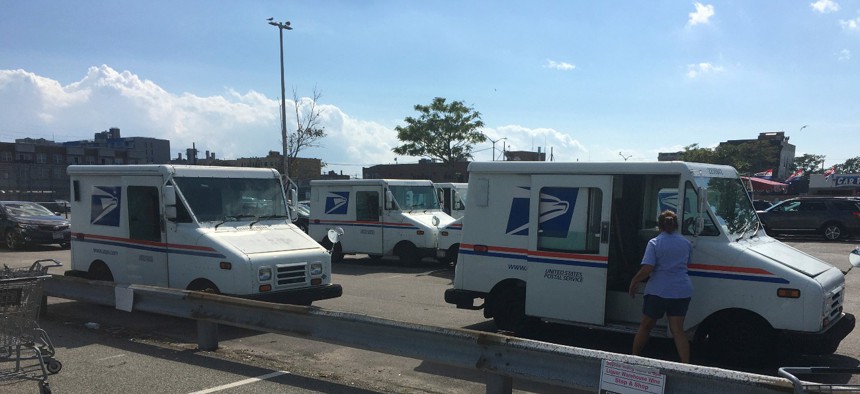
STRF/STAR MAX/IPx
In Court, USPS Blames Mail Delays on 'Poor Judgment' by Local Supervisors
Top officials deflect criticism away from initiatives implemented by embattled Postmaster General Louis DeJoy.
Top management at the U.S. Postal Service in court documents filed Friday deflected blame for recent high-profile mail delays toward “poor judgment” of local supervisors and “workforce performance” issues.
Reforms implemented by Postmaster General Louis DeJoy were never intended to delay mail, the officials said in the filings, and would not have caused any mail to be left behind if not for the problems at the local level. USPS filed the declarations with its objection to an attempt to block the changes as part of a lawsuit brought by the NAACP.
DeJoy has acknowledged his reforms, which have stressed operating all parts of the delivery process on a set schedule while seeking to end late and extra trips, have caused significant mail delays. Postal data show on-time delivery declined between 8% and 10% across USPS offerings after the changes went into effect, though the agency has said performance has picked up in recent weeks. The NAACP is one of many groups to join dozens of states in suing the Postal Service for those and other operational changes they said have hampered the agency’s ability to deliver ballots on time for the upcoming election. The group is seeking a preliminary injunction on DeJoy’s reforms before the U.S. District Court for the Southern District of New York.
Robert Cintron, USPS vice president for logistics, said in his written declaration submitted in opposition to the injunction that postal management never banned extra or late trips for delivering mail in all circumstances. He admitted to crafting under DeJoy’s direction written guidelines explaining when such trips were acceptable or unacceptable. An email from Cintron stated that “trucks must leave on time,” however, and the guidelines dictated late and extra trips should be reduced or eliminated “to the extent possible.”
In practice, that has led to trucks moving throughout the Postal Service’s delivery network without waiting for all the mail to arrive from the previous destination. Typically, postal workers would wait to ensure no mail gets left behind before delivering to distribution centers, post offices or customers. Cintron said he never directed that to occur and took steps to rectify it after on-time performance plummeted.
He added he has long observed that “ineffective management” at a number of facilities has led to disruptions in distribution schedules and “unnecessary trucking costs.”
Angela Curtis, vice president for retail and post office operations, more explicitly passed blame in her declaration.
After the policy emphasizing that all stages of delivery operate on a set schedule without late or extra trips went into effect, Curtis said, she “became aware of local management occasionally exercising poor judgment regarding the dispatch of mail. For example, if all of the mail scheduled for delivery that day was not ready to be loaded onto trucks, local managers let trucks leave at the scheduled time and held the mail for delivery on the next truck available.”
Curtis said postal management in its Washington headquarters has taken steps to fix local mistakes, including finding a “cost-efficient manner” to operate on schedule without leaving mail behind. The vice president also cited contractor failures and “workforce performance” problems as causing the delays that occurred after DeJoy’s reforms went into effect.
During recent congressional testimony, DeJoy also cited a disconnect between his efforts and the local level as a problem for the mailing agency. He repeatedly told lawmakers their complaints were outside his control or stemmed from initiatives before he took office, at one point calling it “outrageous” the buck would stop with him on decisions to remove mail processing equipment at the local level. He did, however, take responsibility for the mail delays attributed to the new scheduling priority.
Postal managers repeatedly said in the court filings that USPS undertook no effort from the headquarters level to limit overtime and any cuts to those hours were a result of local decision making. They faulted a local leader for a widely publicized memorandum that instructed facilities to eliminate overtime and leave mail behind if plants were running behind schedule.
“These documents were prepared by local managers and were not reviewed or approved by headquarters,” Curtis said. “They were distributed locally, not nationally. They do not represent official Postal Service guidance or direction.”
Other postal officials conceded one DeJoy initiative did specifically require mail to be left behind the next day. The Expedited to Street/Afternoon Sortation pilot program that Government Executive first reported in July essentially tasked letter carriers at 200 sites around the country to leave for their routes earlier in the day. That, in turn, required them to leave mail that had not already arrived first thing in the morning for delivery the following day, officials said in the court documents. In addition to removals of processing equipment and collection boxes, DeJoy paused that pilot until at last after the election.
More than a dozen Democratic senators have filed a brief in support of the NAACP’s lawsuit against the Postal Service. There will be several hearings for cases involving the Postal Service next week.







